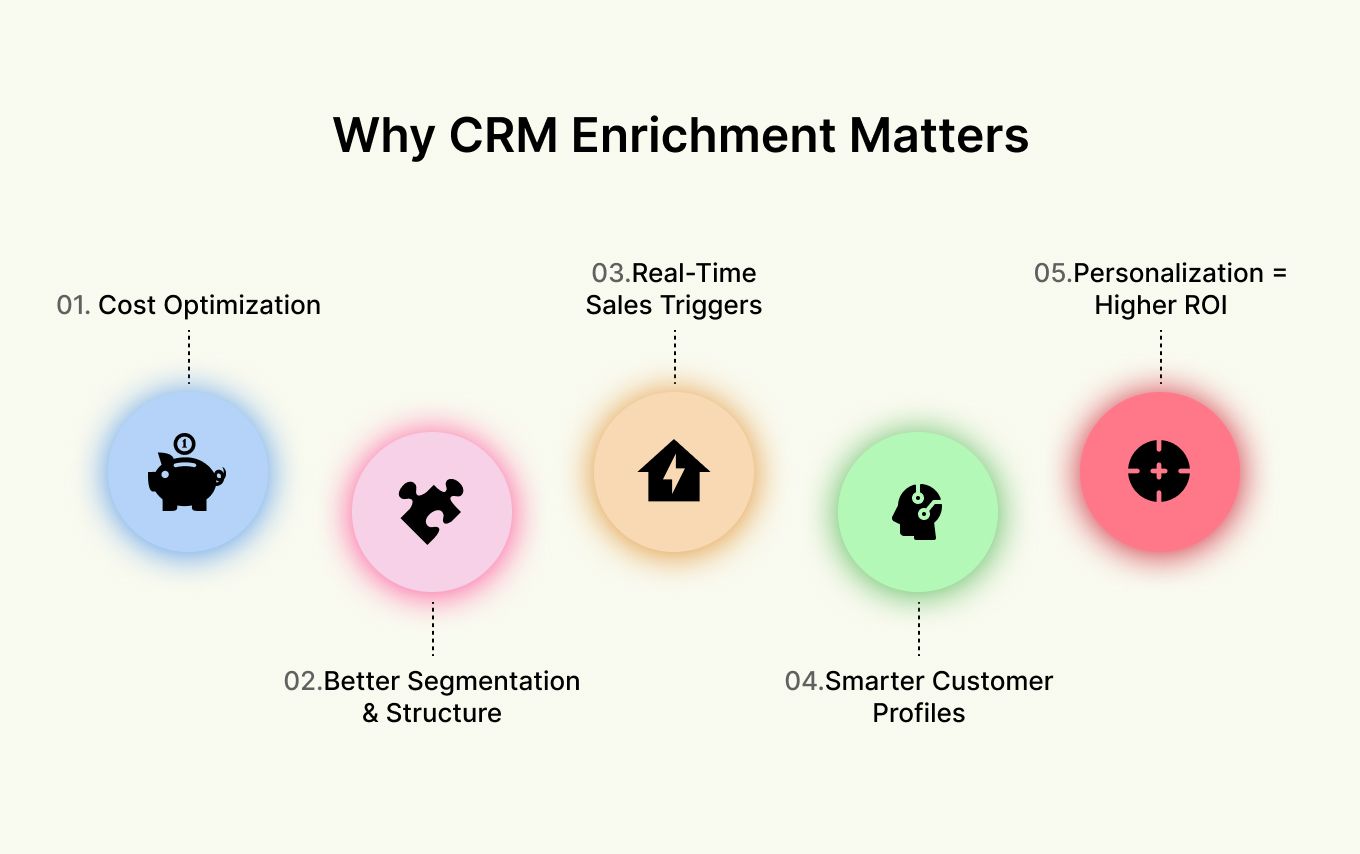Your sales team finally gets a warm lead on the calendar, only to find out the contact left the company three months ago. Another rep spends hours chasing an account, only to realize it was never a good fit in the first place. These aren’t just small setbacks. They’re signs of a CRM filled with outdated, incomplete, or irrelevant data—and they add up fast in lost time and missed revenue.
In this guide, you’ll learn what CRM data enrichment is, why it matters, and how to put it into practice with the right sources, tools, and examples.
What Is CRM Enrichment?
CRM enrichment is the process of improving the data in your Customer Relationship Management (CRM) system by adding fresh, relevant information from internal and external sources. Instead of working with outdated or incomplete records, you build accurate, detailed profiles that support better decision-making.
This often includes verified contact details, firmographic and demographic data, behavioral signals, and even social media activity. With enriched data, your sales and marketing teams can improve lead scoring, segment leads more precisely, personalize outreach at scale, and respond faster to key buying signals, leading to higher engagement and better conversion rates.
Before enrichment, a CRM entry might look something like this (lots of white space):

After enrichment, you might see something like this. Look at all that new information:

Why CRM Data Enrichment Matters
Your CRM is only as useful as the data inside it. Enriching that data gives your team the context they need to make faster decisions, personalize outreach, and focus on the leads that actually convert.

1. Cost Optimization
According to IBM, bad CRM data costs U.S. businesses over $3 trillion each year. Useless or outdated records don’t just clutter your CRM—they waste storage, slow down your team, and lead to poor decisions.
CRM enrichment solves this by replacing low-value data with relevant, verified information. For example, instead of keeping dozens of stale contacts from a company that was acquired, enrichment can surface updated decision-maker info from the new parent company. That saves time and storage while giving your sales team better-qualified leads. The money saved can be reinvested into strategic efforts like account-based marketing or sales enablement.
How It Works:
You enrich your CRM and identify 1,200 duplicate or inactive records. After cleaning them out, your email platform costs drop, your team stops chasing dead leads, and your pipeline becomes easier to manage. The saved budget gets redirected to high-performing channels like outbound.
2. Improved Segmentation and Data Structure
Nearly 90% of marketers say their company doesn’t use data effectively. One common reason is unstructured, incomplete CRM records.
Enrichment tools help clean and format this data for easy segmentation. For instance, by adding job title and seniority level to raw contact records, you can sort leads into personas like “Enterprise CTOs” or “SMB Ops Managers.” That clarity lets your team run focused campaigns instead of blasting the same message to everyone.
How It Works:
Enrichment adds missing fields like industry, revenue, and job seniority across thousands of contacts. With that data in place, you create targeted segments, like mid-market CMOs in SaaS, allowing for more relevant messaging and better conversion rates across campaigns.
3. Faster Responses to Business Signals and Triggers
Knowing when to reach out can be just as important as what you say. Enrichment tools help you catch key signals like job changes, funding rounds, or product launches—all of which can indicate higher intent or a shift in need.
Imagine you sell HR software. Enrichment might flag when a target company hires a new VP of People. With that signal in your CRM, your team can reach out immediately with a relevant pitch, beating competitors to the conversation.
How It Works:
A former prospect changes jobs, and your enrichment tool flags it in real time. You get an alert the same day, reach out with a tailored “congrats on the new role” message, and book a meeting before competitors even notice the move.
4. More Accurate Customer Profiles
Over half of customers expect personalized offers, and that number keeps rising. To deliver, you need a full picture of who your buyers are—not just firmographics, but interests, behaviors, and goals.
B2B CRM enrichment helps fill in those blanks. Let’s say your CRM only has a lead’s name, company, and job title. With enrichment, you might add their recent webinar attendance, preferred tech stack, or hiring patterns. That gives your sales team the context to pitch smarter, like swapping “We help companies grow” for “We help revenue leaders reduce churn in subscription-based models.”
How It Works:
Instead of just knowing someone is a “Marketing Director,” enrichment reveals they use Salesforce, manage a team of five, and just hired two SDRs. That insight helps your team pitch a lead gen solution tailored to their current scale and challenges, resulting in a faster close.
5. Better Personalization Boosts Marketing ROI
McKinsey found that fast-growing companies attribute 40% of their revenue to personalization. Slower-growing businesses? Far less.
Enriched data is what makes personalization scalable. If your CRM includes firmographic, technographic, and behavioral data, you can trigger tailored nurture sequences, product recommendations, or outbound messaging without manual input. For example, a company using Salesforce and hiring SDRs might get a campaign about lead enrichment, while one hiring CS reps sees content about churn prevention.
How It Works:
You enrich your CRM with behavioral and firmographic data, then run a campaign targeting CFOs at Series A startups using QuickBooks. The emails reference their funding round and pain points directly, doubling your click-through rate and tripling replies compared to generic outreach.
Types of Data You Can Enrich in Your CRM
The following are the key types of data that you can enrich to drive growth and enhance customer relationships.
Contact Data
Contact data enrichment in CRMs refers to augmenting basic information about an individual or organization, such as name, email address, phone number, job title, company name and email address. When you enrich contact data, you’ll add as much additional and fresh information as possible to the existing records – enhancing their completeness and accuracy.
Here’s an example of what that could look like:
- Name: John Doe
- Email: [email protected]
- Phone: +1 (555) 123-4567
- Job Title: VP of Sales
- Company Name: XYZ Corp
- Mailing Address: 123 Main Street, City, State, ZIP Code
You can use enrichment to validate data you already have or to fill in the gaps. Typically, as your sales organization grows, so does your data. A significant portion of it decays over time, so you must keep it up-to-date.
Of course, the more relevant info you have, the more complete your customer profiles will be.
Demographic Data
Demographic data encompasses characteristics of individuals or groups within your target accounts, such as age, gender, education level and geographic location.
While your primary audience might be other businesses, you will still be talking to individual stakeholders within them, all of whom have their preferences and needs.
Some examples of an enriched profile could be:
- Name: Susan Jones
- Age: 25-34
- Gender: Female
- Income: $50,000-$75,000
- Education: Bachelor's degree
- Marital status: Married
- Location: New York City, NY
Now, if you're running a campaign for a new product targeted at young professionals, then you know you can put Susan into your target group. On a more personalized basis, Susan could be one of the leads you can use informal outreach with (e.g., subject lines with emojis), as opposed to more senior stakeholders who respond better to formal approaches.
That’s the power of enriched demographic data. It improves your segmentation so you can be confident you’re getting the right offers in front of the right eyes.
Firmographic Data
Firmographic data shows you the characteristics of businesses within your target market, such as industry, company size, revenue, location and organizational structure.
For example, your firmographic data might look something like this:
- Company: XYZ Corporation
- Industry: Information Technology
- Company Size: 500-1000 employees
- Annual Revenue: $100 million - $500 million
- Location: San Francisco, CA
- Key Decision Maker: John Smith, Chief Technology Officer
Now, if you're launching a campaign for a new enterprise software solution tailored to mid-sized technology companies, you can confidently include XYZ Corporation in your target audience. More importantly, you can customize your messaging to resonate with John Smith's role as the Chief Technology Officer, highlighting technical features and benefits that align with his responsibilities and objectives.
Speaking of stakeholders, your firmographic data can also identify organizational structures, so you know who the stakeholders on the buying committee are. In addition to the main economic buyer, you’ll be able to find out the technology and financial stakeholders.
Additionally, enriched firmographic data enables you to segment your target market effectively. For example, you might identify clusters of companies in similar industries or geographical regions that have specific needs or pain points.
Behavioral Data
Behavioral data is one of the most actionable CRM data types. It tracks how individuals interact with your business, including website visits, product views, purchase history and engagement with campaigns.
With these types of insights, you can better capture opportunities and understand the customer lifecycle.
A CRM profile enriched with behavioral data might look something like this:
- Name: Joe Smith
- Website visits: 5 (in the past 30 days)
- Product views: Product A, Product B
- Purchase history: no purchases
- Search history: searched “Product A” on (date)
Let’s say you have a customer who frequently visits your website, engages with your emails, does searches but hasn't made a purchase yet, just like our Joe above. You can use this data to reach out, perhaps with a discount for one of the products he’s reviewed, locking in that sale.
Similarly, this data could also tell you when a customer is interested in upgrading their plans because they’re reaching maximum usage or perhaps when they’d be open to hearing your cross-sell offer.
Sales Event and Trigger Data
It’s not just individual, physical people who behave. Companies have their behavioral signals, too. Sales trigger data can point you to specific events or actions within a company that signal potential buying opportunities or changes in needs.
Typically, the sales trigger data looks at events such as the following:
- Funding rounds
- Mergers and acquisitions
- Leadership changes
- Product launches
- Mass hiring (or layoffs)
- Regulatory compliance initiatives
For example, notifications about mass hiring could suggest increased demand for certain products or services, while layoffs might indicate cost-cutting measures and a need for more cost-effective solutions in that area.
Technographic Data
Technographic data is info about the tech stack and preferences of prospects, such as software usage, IT infrastructure and online behavior.
Here’s an example of what we mean:
- Company: XYZ Corp
- Software: Hubspot, Findymail, Slack and Pipedrive
- IT infrastructure: AWS cloud
- Online behavior: Likes tech content, follows tech influencers
- Social media profiles: Facebook, LinkedIn, X
How can technographic data help? Let’s say you sell B2B CRM software that specializes in XYZ Corp’s industry.
You can see they’re already using Hubspot from the enriched data, so you can develop a targeted cold email highlighting how your CRM is better suited for their needs.
Of course, there are other types of data you can enrich. But at its core, the purpose of enriched CRM data is to provide insights you couldn’t find without it.
Data Sources for CRM Enrichment
The quality of your CRM data depends on where it comes from. To keep records fresh, accurate, and insightful, you need a mix of reliable internal and external sources. Here's a breakdown of the four most effective categories.
Public databases
Publicly available sources like LinkedIn, company websites, and press releases offer a goldmine of up-to-date business information. These databases help you enrich firmographic details such as company size, industry, or leadership changes without needing to rely on third parties. They’re especially useful when paired with tools that automate data extraction and enrichment directly into your CRM.
Third-party data providers
Platforms like ZoomInfo, Clearbit, Apollo, and FullContact offer access to massive databases of B2B contact and company data. These services aggregate information from hundreds of sources, then clean, structure, and validate it. The benefit? You can scale enrichment efforts fast, adding verified emails, technographic data, or sales triggers without having to build the pipeline yourself.
Customer interactions
Not all enrichment comes from outside. Every email, form submission, live chat, and survey your team collects is a potential source of high-quality data. These touchpoints reveal behavioral insights—like buying intent, product preferences, or stage in the funnel—that third-party tools often miss. Feeding these insights back into your CRM helps sales and marketing teams tailor messaging and timing.
Social media insights
Monitoring platforms like LinkedIn, X (formerly Twitter), and even Instagram can surface key signals about your leads and accounts. Whether it's a job change, company milestone, or thought leadership post, social updates are often the first sign of a new opportunity. With the right enrichment tools or social listening workflows, you can turn these signals into CRM-ready data points that drive timely outreach.
Common CRM Enrichment Challenges (And How to Overcome Them)
CRM enrichment can unlock serious value, but it’s easy to run into problems that slow you down or backfire completely. Whether it’s messy data, unclear priorities, or disconnected systems, these issues can block the impact of your enrichment efforts. Below, we break down three of the most common challenges and how to fix them.
1. Dealing with Data Silos
Data silos (situations when data isn’t easily exchanged between systems) can pose significant challenges in CRM enrichment. To overcome this challenge, fostering a culture of communication and collaboration across departments is paramount.
You need to implement integrated CRM systems and regular cross-departmental meetings to break down silos and ensure that valuable data is shared effectively throughout the organization.
2. Ensuring Data Accuracy and Consistency
Inaccurate or outdated data leads to misguided decisions and wasted resources. Make sure you have robust data validation processes and regular data hygiene practices.
Use data cleansing tools like Datacare to identify and correct inaccuracies and establish clear data entry guidelines to ensure consistency. Regularly audit your CRM database and take proactive steps to address them promptly.
3. Deciding What Data is Important
While there's a wealth of data to collect, not all of it is relevant to your specific needs. For example, a retail business may find demographic data and purchase history vital for understanding customer preferences, while a B2B company may prioritize firmographic data and lead intent signals.
Conduct thorough research and analysis to identify the key data points that align with your business objectives. Start by defining your ICP and then focus on collecting data that directly contributes to achieving your goals.
CRM Enrichment Best Practices
A good strategy isn’t just about what data you enrich, but how you manage it. These best practices will help you get cleaner data, better insights, and real results from your CRM.
Define Your Acceptable CRM Data Quality
Establish clear criteria for acceptable data quality within your organization, considering factors like relevance, accuracy and completeness.
For example, customer data should include information such as contact details, purchase history and product preferences. Similarly, you can implement data verification checks. When recording customer addresses, you could verify postal codes against official databases to minimize errors.
When integrating third-party tools or working with large sales teams, enforce completeness standards for your data. For example, a customer profile must include fields such as name, email address and purchase history to be logged in the first place.
Finally, the data should be uniform across databases and apps.
Keep Your Data Up-to-Date
Prospects change jobs, email addresses stop accepting mail and the market keeps shifting. The data that may have been accurate one month ago doesn’t have to be accurate today.
While we do advocate regular data audits, you can’t constantly re-check the data. And if you don’t, you risk your email deliverability and poor campaign performance. That’s why it’s crucial to integrate tools like Findymail which not only populate your CRM with data but keep it accurate.
Conduct Regular Health Checks and Audits
Schedule routine data audits to identify and address any inaccuracies, redundancies, or outdated information to maintain the integrity and reliability of your database.
In our rush to make the most of data, we tend to “hoard” it. With every new salesperson on your team, that mountain only grows. When the data is accurate, it’s an asset, but it tends to decay.
Don’t work with inaccurate information. Check the health status of your data.
Use Enrichment Tools
Invest in advanced CRM enrichment tools like Findymail, Clearbit, ZoomInfo and Crunchbase to streamline the enrichment process, automate repetitive tasks and ensure data accuracy.
Don’t Forget Data Privacy and Compliance
Follow data protection regulations like GDPR and CCPA when conducting enrichment activities involving personally identifiable information (PII).
Empower Your Team with CRM Enrichment
CRM enrichment is a powerful strategy in our data-driven day and age. You’ll get a complete view of your customers, allowing you to spot the opportunities you’d otherwise miss.
With this ultimate guide, you can take the first steps into unlocking the full potential of your CRM.
And to get a headstart, sign up for Findymail’s Datacare service. All the benefits of data cleansing and enrichment – without the painful implementation.






